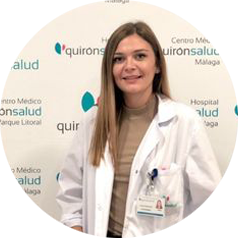Rocío Fernández Jiménez
Quirónsalud Junior Researcher Award


March 25, 2024
A graduate in Human Nutrition and Dietetics, and a member of Quirónsalud for the past 7 years, she was the recipient of a training fellowship at the Policlinico San Matteo Hospital in Pavia (Italy), where she gained specialized training in phase angle bioimpedance techniques. These same techniques form the basis of her most recent study, for which she received the Quirónsalud Junior Researcher Award in the current edition. She is currently pursuing her doctoral studies in patients with idiopathic pulmonary fibrosis, leading several lines of research and having authored at least five scientific publications in recent years.
Project Summary and Clinical Relevance
Title: Phase Angle and Handgrip Strength as a Predictor of Disease-Related Malnutrition in Admitted Patients: 12-Month Mortality. Journal: Nutrients.
The specialists from the Endocrinology and Nutrition Department at Hospital Quirónsalud Málaga have demonstrated the risk of mortality and hospital stay length based on patients’ nutritional status using new diagnostic techniques. This is one of the conclusions of the research for which nutritionist Rocío Fernández of the team was recently awarded the Quirónsalud Junior Researcher Award in the category of Best Junior Researcher of the Quirónsalud Group. For this study, the principal investigator, Dr. Rocío Fernández, together with the Head of the Endocrinology and Nutrition Department, Dr. José Manuel García Almeida, and nutritionist Lara Dalla, conducted a systematic screening over five years involving nearly 600 patients, applying the latest measurement techniques in clinical endocrinology. "A hospital-level investigation was carried out where the nutritional status of 570 patients was evaluated using new techniques for measuring body composition, dynamometry, and phase angle bioimpedance," explains Fernández.
The nutrition specialists Rocío Fernández and Lara Dalla cross-referenced the results obtained during the five years of this hospital screening study, the conclusions of which are, in their opinion, of relevance for determining the length of patients’ hospital stays. "It was observed that these new techniques serve as excellent tools to determine the nutritional status of the admitting patient and, furthermore, they are an excellent prognostic factor for hospital stay duration and mortality rates in a specific patient profile."
In fact, the results obtained have been incorporated into the clinical protocol at Hospital Quirónsalud Málaga, which has implemented them with the goal of improving quality standards concerning patient care, as they help reduce hospital stay length and the likelihood of complications or readmissions. According to data on the prevalence of hospital malnutrition and associated costs in Spain (PREDYCES study), the rate of hospital malnutrition stands at 25-30%. For experts, this percentage is difficult to detect or assess as there was no unified protocol until now for tracking patients' nutritional status. Now, the research conducted by the specialists from Málaga provides guidelines for hospital staff to assess the nutritional status of patients. In this sense, the success achieved in this study has led the researchers to initiate another hospital-based study, where the nutritional status of hematological patients will be assessed in order to draw conclusions by applying these new techniques.



